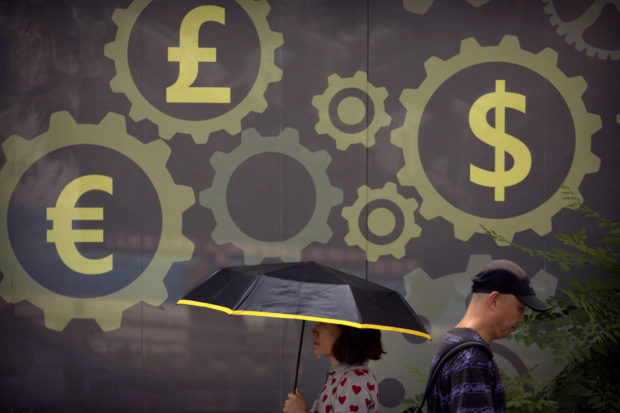Survey: US companies in China hurt by tariff war

People walk past a mural displaying world currency symbols on the outside of a bank in Beijing. Amid a worsening tariff battle, China is putting off accepting license applications from American companies in financial services and other industries until Washington makes progress toward a settlement, an official of a business group said Tuesday, Sept. 11, 2018. (AP)
BEIJING — Two-thirds of American companies in China say they have been hurt by the spiraling U.S.-Chinese tariff war, two chambers of commerce reported Thursday, and they appealed to Washington and Beijing to restart negotiations aimed at a settlement.
More companies say they will suffer if President Donald Trump goes ahead with a planned tariff hike on $200 billion of Chinese imports in their fight over Beijing’s technology policy, according to the American Chambers of Commerce in China and in Shanghai.
In addition to tariffs, companies report China also is retaliating by slowing down customs clearance for their goods and stepping up inspections and other bureaucratic processes, the chambers said.
“American companies are suffering both from China’s retaliatory tariffs, and — ironically — from U.S. tariffs designed to harm the Chinese economy,” said the two groups in a statement. “AmCham China and AmCham Shanghai urge both governments to return to the negotiating table.”
The two sides have imposed 25 percent tariffs on $50 billion of each other’s goods in the dispute over American complaints that Beijing steals or pressures companies to hand over technology. American officials also say plans for state-led creation of Chinese champions in robotics and other fields violate its market-opening commitments and they worry U.S. industrial leadership might be eroded.
Article continues after this advertisementBeijing has issued a list of $60 billion of American imports for retaliation if Trump’s next tariff hike goes ahead.
Article continues after this advertisementChina is running out of American imports for retaliation due to their lopsided trade balance but threatened unspecified “comprehensive measures” in June. That prompted worries it would use regulatory controls to disrupt business operations in China.
Another business group, the U.S.-China Business Council, said this week Chinese officials told it they were postponing accepting license applications from American companies in financial services and other fields until relations improve.
The chairman of the American chamber, William Zarit, warned the Trump administration might be underestimating China’s determination to fight back.
“The U.S. Administration runs the risk of a downward spiral of attack and counterattack, benefiting no one,” said Zarit in the statement.
The two governments have given no indication of plans for more talks since envoys met in Washington on Aug. 22 but reported no progress.
Some 63.6 percent of more than 430 companies that responded to the survey said profits and customer demand have fallen due to the U.S. tariffs and 62.5 percent said the same about retaliatory Chinese tariffs.
Some 74.3 percent said they would be affected if Washington’s tariff increase of $200 billion of Chinese goods goes ahead. Some 67.6 percent said the same of China’s planned retaliatory tariffs on $60 of American goods.
The survey was conducted between Aug. 29 and Sept. 5.
Some 52.1 percent of companies said Chinese authorities are subjecting them to “qualitative measures” including slower customs clearance and increased inspections and bureaucratic processes.